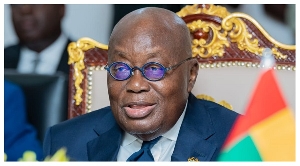- Home - News
- TWI News | TV
- Polls
- Year In Review
- News Archive
- Crime & Punishment
- Politics
- Regional
- Editorial
- Health
- Ghanaians Abroad
- Tabloid
- Africa
- Religion
- Election 2020
- Coronavirus
- News Videos | TV
- Photo Archives
- News Headlines
- Press Release
General News of Tuesday, 22 April 2014
Source: ultimate1069.com
Ghana’s exam-centered education must change - Prof. Baah
A Lecturer and Head of Political Science Department of the Kwame Nkrumah University of Science and Technology (KNUST) says Ghana’s educational system which solely assesses students based on examination scores is not the best.
According to Prof. Richard Amoako Baah, assessing students just on the basis of exam scores as pertains in the country is not a fair conclusion to grade students.
Speaking on the Ultimate Morning Show, he wondered, “you’ve gone to school for three to four months and one day is going to determine what you really know? There is something called exam anxiety and some people are not able to perform well under pressure, and all of these are considerations”.
Citing examples from advanced countries who are now shifting attention from purely exam-based student assessment to back his point, the University Professor outlined, “there is an Ivy League School in Connecticut, the Wesleyan University, and if you are admitted, it is very competitive, but for the first two years, no exams. Just take any course and explore your abilities and they are the ones running the world. You go to the school and the kind of research and chemistry experiments the students are doing is like what some advanced graduates should be doing, he noted.
Further buttressing his point, he made allusions to the University of California, the biggest university system in the United States. “They have stopped using the general part of the SAT because they say students pass it but when they are admitted, it doesn’t prove that they are any better than the others and so they threw it out”.
Prof. Richard Amoako Baah indicated that he had tested the system of using other means for assessing students before and found it credible, as he never made any of his final year students to take exams in universities he lectured in the United States.
He cautioned that the nation couldn’t reap the benefits of educating its students if students keep chewing and cramming notes to reproduce at the end of semesters for marks.
“When you start using test scores alone, where is the critical thinking element in this? And this is why the president keeps saying we are educating people who cannot think. It is comprehension and not memorization,” he said.
He, however, suggested that, for that needed element of comprehensive education to thrive in Ghana, it would require students spending more quality time in school with their teachers. He was quick to add, however, that this is a challenge the country is now facing with the huge students to teacher ratio, making it impossible for teachers to adequately know the strengths and weaknesses of their students.
He indicates that several advanced countries are now reaping benefits after shifting from placing premium on examination scores. Prof. Richard Amoako Baah made a strong case for Ghana to start addressing the systems in its educational system as a social issue worth addressing.
In Prof. Baah’s view, it is evidently clear that students are even cheating in exams. Teachers are allowing students to bring foreign materials to the lecture hall. You cannot get students and just teach them to pass exams; exams are not the purpose of education, examination is just a small way of finding whether the students get what they are being taught; that is the difference. Knowledge is the purpose of education not examination,” he noted.











